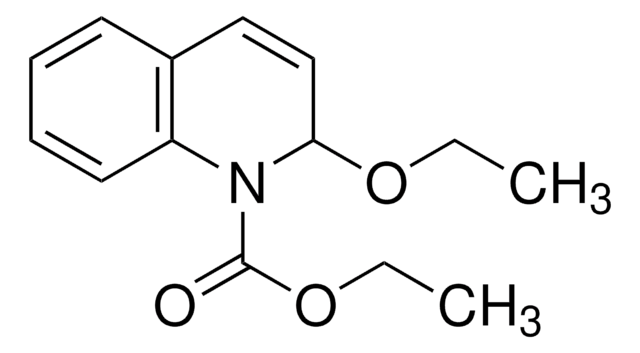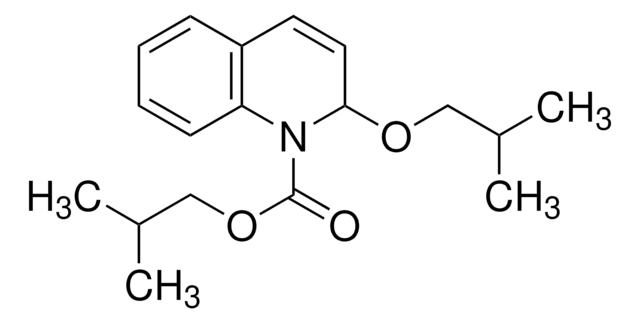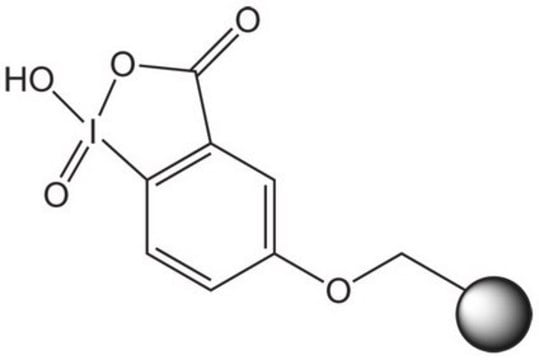8.55046
IIDQ-polystyrene
Novabiochem®
Se connecterpour consulter vos tarifs contractuels et ceux de votre entreprise/organisme
About This Item
Code UNSPSC :
13111023
Nomenclature NACRES :
NA.22
Produits recommandés
Niveau de qualité
Gamme de produits
Novabiochem®
Forme
beads
Capacité de réaction
reaction type: solution phase peptide synthesis
Fabricant/nom de marque
Novabiochem®
Application(s)
peptide synthesis
Température de stockage
2-8°C
Catégories apparentées
Description générale
IIDQ-polystyrene (IIDQ-PS) [1] is a polymer-supported version of the IIDQ coupling reagent [2]. IIDQ has many advantages over conventional carbodiimide- or uronium-based reagents: no preactivation step is required, and acid, amine and coupling reagent can be added in any order; in contrast to uronium-based reagents like HBTU, it cannot form guanidinium by-products; and it is totally stable to base. The treatment of a carboxylic acid with IIDQ-PS in DCM or MeCN rapidly generates in situ the corresponding isobutoxycarbonyl mixed anhydride [3]. Attack by nucleophiles preferentially takes place at the less hindered and more electrophilic carbonyl of the carboxylic acid moiety, releasing only volatile carbon dioxide and isobutanol as by-products. If reaction is carried out in the presence of an amine, amide bond formation occurs concurrently with generation of the anhydride. Alternatively, addition of NaBH4 or polymer-supported borohydride to the anhydride will lead directly to the corresponding alcohol. IIDQ-PS appears to be particularly effective for mediating the acylation for anilines, and has also been found to couple peptide fragments without epimerization. In a comparative study, IIDQ-PS was found to give higher yields and greater purities than HATU, EDC-PS or DCC-PS [4]. Occasionally, with some secondary amines the formation of isobutyl carbamate by-products has been observed, resulting from attack by the amine at the carbonyl group.
Literature references
[1] E. Valeur, et al. (2005) Chem. Commun., 1164.
[2] Y. Kiso, et al. (1973) Chem. Pharm. Bull., 21, 2507.
[3] J. R. Vaughan (1951) J. Am. Chem. Soc., 73, 3547.
[4] E. Valeur & M. Bradley, unpublished results.
Literature references
[1] E. Valeur, et al. (2005) Chem. Commun., 1164.
[2] Y. Kiso, et al. (1973) Chem. Pharm. Bull., 21, 2507.
[3] J. R. Vaughan (1951) J. Am. Chem. Soc., 73, 3547.
[4] E. Valeur & M. Bradley, unpublished results.
Liaison
Replaces: 01-64-0469
Remarque sur l'analyse
Color (visual): yellow to beige to amber
Appearance of substance (visual): beads
Loading (determined by HPLC after reaction of 3-phenylpropionic acid with cyclohexlamine): 1.3 - 1.9 mmol/g
Swelling Volume (in DMF): lot specific result
The polymer matrix is copoly (styrene-1 % DVB) 200 - 400 mesh.
Appearance of substance (visual): beads
Loading (determined by HPLC after reaction of 3-phenylpropionic acid with cyclohexlamine): 1.3 - 1.9 mmol/g
Swelling Volume (in DMF): lot specific result
The polymer matrix is copoly (styrene-1 % DVB) 200 - 400 mesh.
Informations légales
Novabiochem is a registered trademark of Merck KGaA, Darmstadt, Germany
Code de la classe de stockage
11 - Combustible Solids
Classe de danger pour l'eau (WGK)
WGK 1
Point d'éclair (°F)
Not applicable
Point d'éclair (°C)
Not applicable
Certificats d'analyse (COA)
Recherchez un Certificats d'analyse (COA) en saisissant le numéro de lot du produit. Les numéros de lot figurent sur l'étiquette du produit après les mots "Lot" ou "Batch".
Déjà en possession de ce produit ?
Retrouvez la documentation relative aux produits que vous avez récemment achetés dans la Bibliothèque de documents.
Notre équipe de scientifiques dispose d'une expérience dans tous les secteurs de la recherche, notamment en sciences de la vie, science des matériaux, synthèse chimique, chromatographie, analyse et dans de nombreux autres domaines..
Contacter notre Service technique








